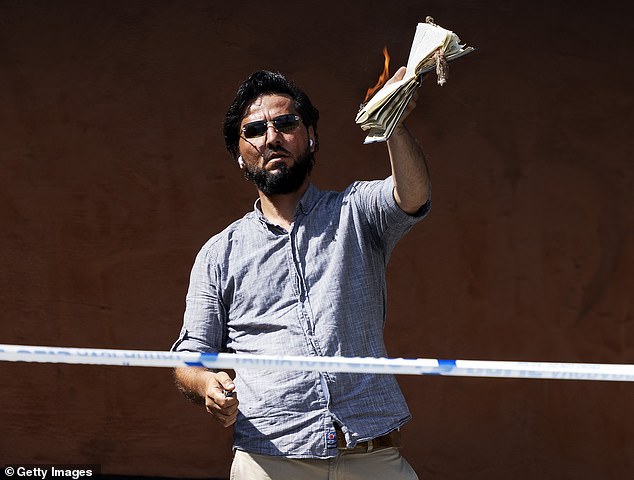
Dozens of Iraqi protesters stormed the Swedish embassy in Baghdad today over the burning of a Koran by an Iraqi protester in Stockholm on Wednesday.
Video showed an angry mob breaking through a wrought-iron gate and climbing on top of the compound, as global fury grows over the stunt.
It came after several Muslim countries condemned Sweden for allowing the Iraqi man to burn a Koran outside Stockholm’s main mosque.
Under a heavy police presence and in front of a crowd of 200, Salwan Momika, a 37-year-old who fled to Sweden several years ago, put bacon in the pages of a Koran before stomping on it and setting several pages alight.
Police had granted him a permit for the protest in line with free-speech protections after an appeals court rejected their ban on Koran burning protests, but said later the man had been charged with agitation against an ethnic or national group.
The stunt sparked anger across the Muslim world, including in Turkey which is currently blocking Sweden’s bid to join the NATO military alliance.
Iraq slammed the burning of the Koran, calling it ‘racist’ and ‘irresponsible’, while Morocco recalled its ambassador to Stockholm late on Wednesday.
Anger boiled over in Iraq today with demonstrators storming inside the Swedish embassy in the capital of Baghdad.
The demonstrators, supporters of firebrand Shiite leader Moqtada Sadr, remained inside for about 15 minutes before leaving peacefully as security forces deployed, a press photographer who witnessed the scenes unfold said.
The United States State Department also weighed in, with spokesman Vedant Patel calling the burning of religious texts ‘disrespectful and hurtful’. ‘What might be legal is certainly not necessarily appropriate,’ he said.

Under a heavy police presence and in front of a crowd of 200, Salwan Momika (pictured), a 37-year-old who fled to Sweden several years ago, put bacon in the pages of a Koran before stomping on it and setting several pages alight
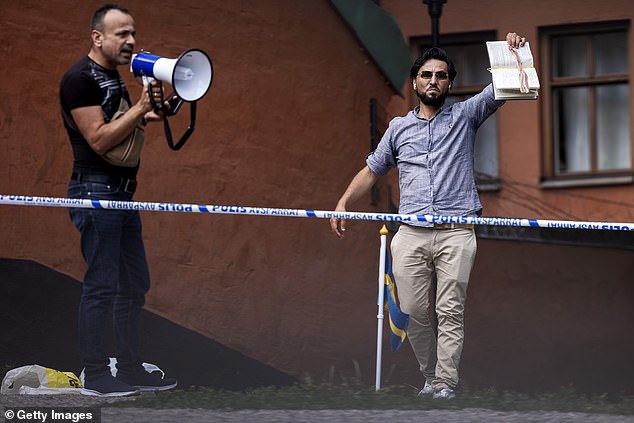

Police had granted Salwan Momika (right) a permit for the protest in line with free-speech protections after an appeals court rejected their ban on Koran burning protests, but said later the man had been charged with agitation against an ethnic or national group
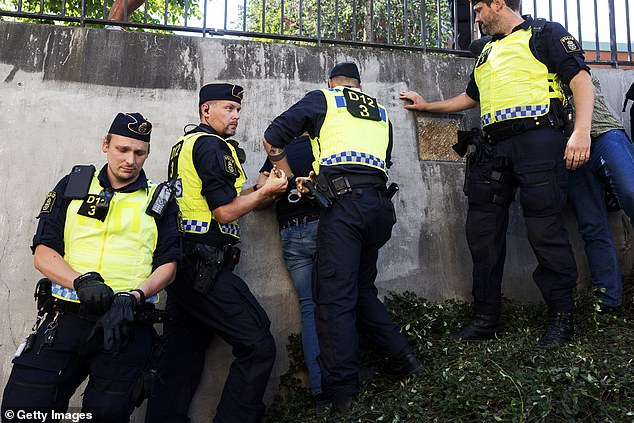

Police had cordoned off an area in a park next to the mosque separating Momika and a co-protester from the crowd. One man was understood to have been taken away from the scene when he was caught carrying a rock. Pictured: Police are seen detaining a man at the scene
Wednesday was not the first time a Koran has been burned in a public protest this year. In January, far-right Danish political party politician Stram Kurs Rasmus Paludan burned the religious book outside the Turkish embassy in Stockholm.
The move angered Ankara, which is already using its grievances with Stockholm and its government to continue to block Sweden’s ascension to NATO.
The Iraqi government in a statement issued late on Wednesday – hours after the burning – strongly condemned ‘the repeated acts of burning copies of the holy Koran by individuals with extremist and disturbed minds’.
‘These acts demonstrate a hateful and aggressive spirit that goes against the principles of freedom of expression,’ it said.
‘They are not only racist but also promote violence and hatred.
‘These irresponsible actions, in direct conflict with the values of respect for diversity and the beliefs of others, are unequivocally condemned.’
Iran joined in the condemnation on Thursday, calling the Koran burning ‘provocative, ill-considered and unacceptable’.
‘The government and people of the Islamic Republic of Iran… do not tolerate such an insult and strongly condemn it,’ said foreign ministry spokesperson Nasser Kanani.
‘The Swedish government is expected to seriously consider the principle of responsibility and accountability in this regard, while preventing the repetition of insulting the holy sanctities,’ he added.
Morocco also condemned the Koran burning and recalled its ambassador to Stockholm late Wednesday.
‘This new offensive and irresponsible act disregards the feelings of more than a billion Muslims, at this sacred time of the great pilgrimage to Mecca and the blessed feast of Eid al-Adha,’ it said in a statement.
‘Faced with these repeated provocations, committed under the complacent gaze of the Swedish government’, Morocco summoned Sweden’s charge d’affaires in Rabat and recalled its ambassador, it added.
Jordan also issued a statement on Wednesday, saying it was a dangerous display of hatred and Islamophobia that cannot be justified as freedom of expression.
Turkish Foreign Minister Hakan Fidan called the burning of the pages of the Islamic holy book ‘despicable.’
‘It is unacceptable to allow these anti-Islamic actions under the pretext of freedom of expression,’ Turkish Foreign Minister Hakan Fidan wrote on Twitter. ‘Turning a blind eye to such atrocious acts is to be complicit.’
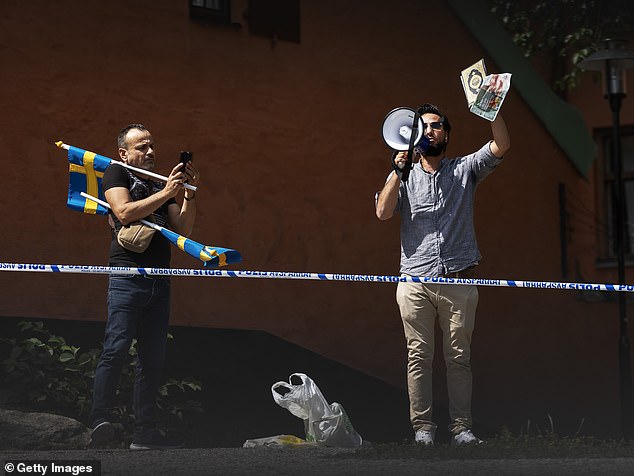

The stunt (pictured) sparked anger across the Muslim world, including in Turkey which is currently blocking Sweden’s bid to join the NATO military alliance
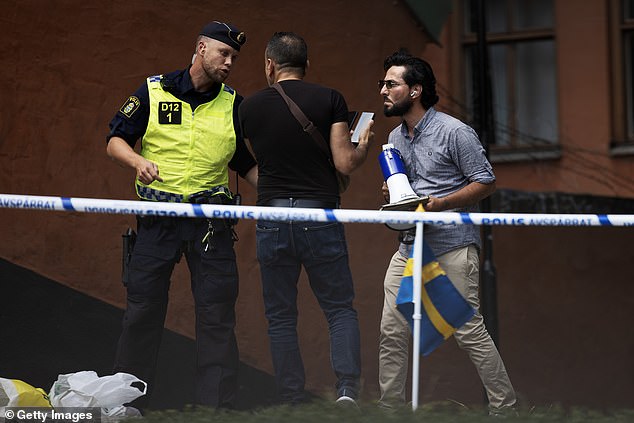

Police had granted Momika (right) a permit for the protest in line with free-speech protections after an appeals court rejected their ban on Koran burning protests, but said later the man had been charged with agitation against an ethnic or national group
Some 200 onlookers witnessed Momika – one of the two protesters – tearing up pages of a copy of the Koran and wiping his shoes with it before putting bacon in it and setting the book on fire. The other spoke into a megaphone.
Some of those present shouted ‘God is Great’ in Arabic to protest against the burning, and one man was detained by police after he attempted to throw a rock.
A supporter of the protest shouted ‘let it burn’ as the holy book caught fire.
While Swedish police have rejected several recent applications for anti-Koran demonstrations, courts have overruled those decisions, saying they infringed on freedom of speech.
Turkey is blocking Sweden’s NATO membership bid due to what it perceives as Stockholm’s failure to crack down on Kurdish groups it considers ‘terrorists.’
Ankara took particular offence at another Koran burning outside its Stockholm embassy in January by Paludan.
A meeting between the countries’ top diplomats is scheduled for July 6 at the NATO headquarters in Brussels, with NATO counterparts pushing for Turkey to grant the green light to Sweden by the time the summit takes place in Lithuania on July 11-12.
In its written decision granting a permit for the protest, Stockholm police said the security risks associated with the burning ‘were not of a nature that could justify, under current laws, a decision to reject the request’.
Momika, 37, who fled to Sweden several years ago, had asked police for permission to burn the holy book ‘to express my opinion about the Koran’.
Ahead of the protest, Momika told news agency TT he also wanted to highlight the importance of freedom of speech.
‘This is democracy. It is in danger if they tell us we can’t do this,’ Momika said.
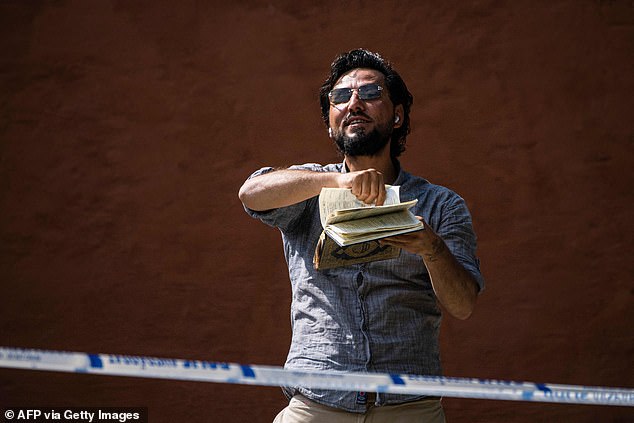

Police later said in a statement that the protest (pictured) had not caused ‘disturbances to order,’ but added that an investigation had been opened regarding ‘agitation against an ethnic group’ because Momika had chosen to burn the Koran near a mosque
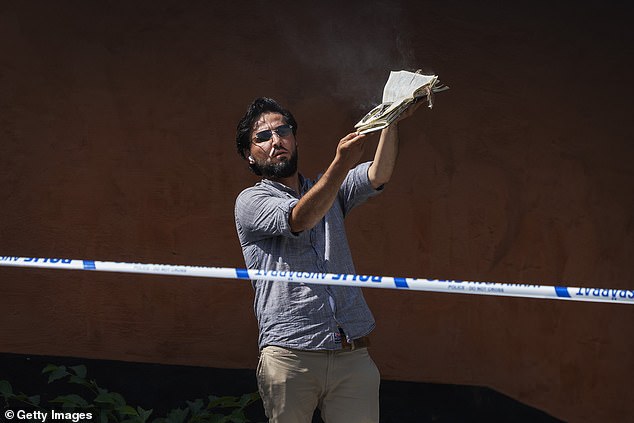

Salwan Momika is seen on Wednesday holding up a smoking Koran during his stunt
Police had cordoned off an area in a park next to the mosque separating Momika and a co-protester from the crowd. One man was understood to have been taken away from the scene when he was caught carrying a rock.
Police later said in a statement that the protest had not caused ‘disturbances to order,’ but added that an investigation had been opened regarding ‘agitation against an ethnic group’ because Momika had chosen to burn the Koran near a mosque.
Police added he was also being investigated for violating a temporary ban on lighting fires – in place due to a heatwave.
Noa Omran, a 32-year-old artist from Stockholm, called the protest ‘insane’.
‘It’s just hatred masquerading in the name of democracy and freedom, which it isn’t,’ the woman, who said her mother was from a Muslim background, said at the scene.
The police authorisation for the protest came two weeks after a Swedish appeals court rejected the police’s decision to deny permits for two demonstrations in Stockholm which were to include Koran burnings.
Police had at the time cited security concerns, following the January protest which led to weeks of demonstrations and calls for a boycott of Swedish goods.
Prime Minister Ulf Kristersson told a press conference on Wednesday he would not speculate about how the protest could affect Sweden’s NATO process.
‘It’s legal but not appropriate,’ he said, adding that it was up to the police to make decisions on Koran burnings.
Representatives of the mosque were disappointed by the police decision to grant permission for the protest on the Muslim holiday of Eid al-Adha, mosque director and Imam Mahmoud Khalfi said on Wednesday.
‘The mosque suggested to the police to at least divert the demonstration to another location, which is possible by law, but they chose not to do so,’ Khalfi said.
The United States, the largest power in NATO, joined criticism of the Koran burning but reiterated its support for Sweden’s entrance into the alliance.
‘We’ve said consistently that the burning of religious texts is disrespectful and hurtful and what might be legal is certainly not necessarily appropriate,’ State Department spokesman Vedant Patel told reporters in Washington.
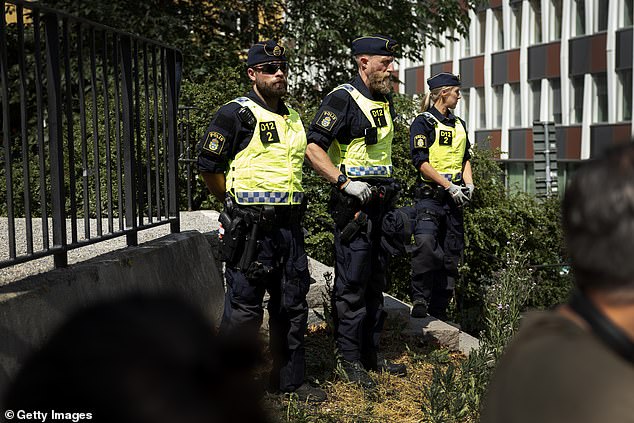

Police during a protest where a koran was burned at the Stockholm mosque on June 28
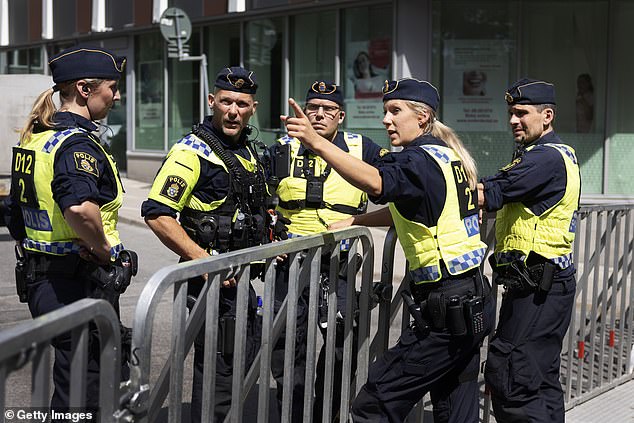

Police during a protest where a koran was burned at the Stockholm mosque on June 28
‘We continue to believe that Sweden should become a NATO member as soon as possible,’ he said, calling the country a ‘strong, capable defence partner that shares NATO’s values.’
Speaking to newspaper Aftonbladet in April, Momika said his intention was not to sabotage Sweden’s NATO bid and that he had considered waiting to stage his protest until after the country had joined the alliance.
‘I don’t want to harm this country that received me and preserved my dignity,’ Momika told the newspaper.
Up to 10,000 visitors attend Stockholm’s mosque for Eid celebrations every year, according to Khalfi.

